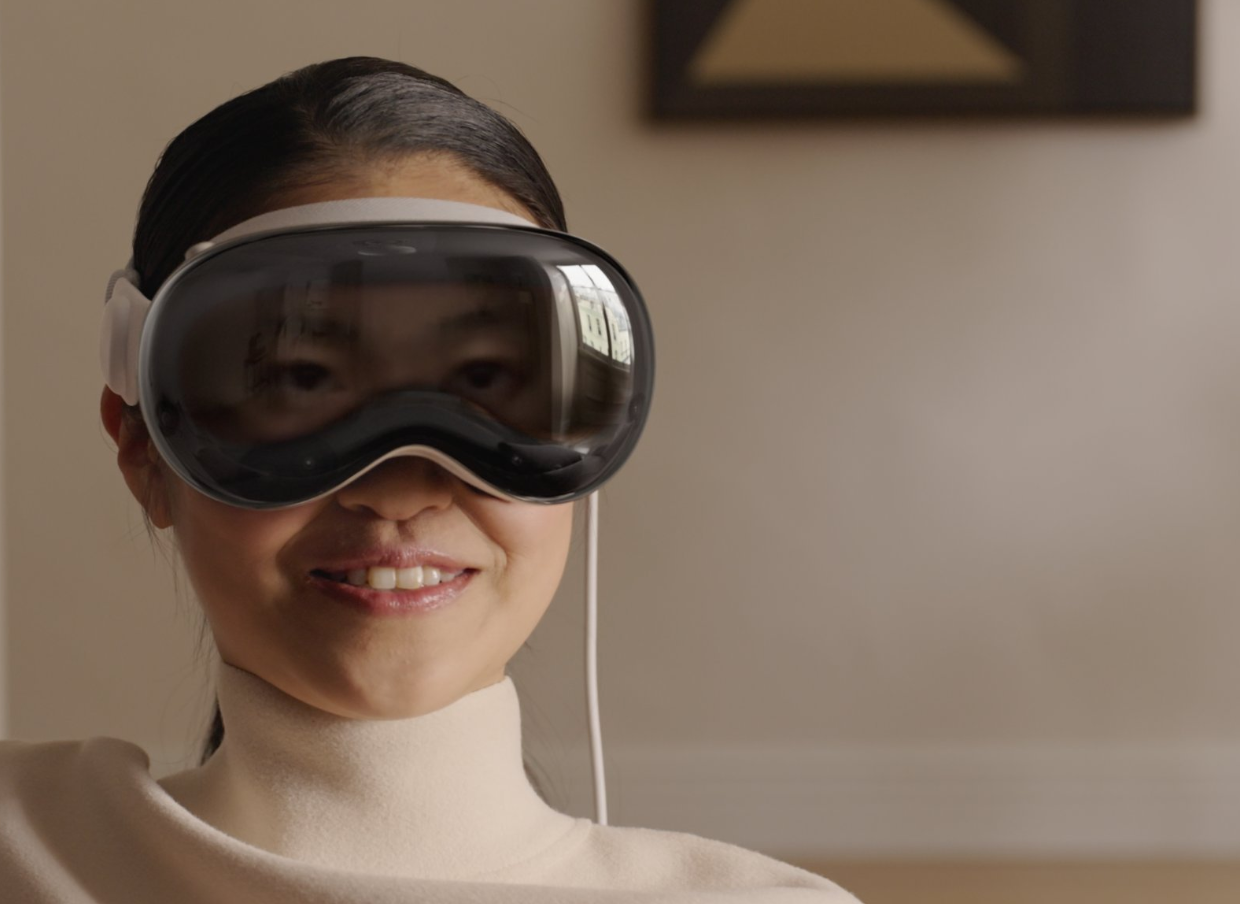
Sponsored By: Brilliant
This Sunday Digest is brought to you by Brilliant, the easiest, most effective way to level up on core concepts in math, data analysis, computer science, and more.
Behold, the most dangerous words I have ever published: My wife is wrong on this one.
I already know she will hate Apple’s Vision Pro headset, primarily driven by the fact that it looks stupid. It is, of course, a deeply silly device. Strapping $3,500 of silicon directly over your eye sockets is frankly ridiculous. My wife will certainly mock me, and I assume she will make a joke about me appearing to be a horsefly.
Despite never having a desire to buy a VR device before in my life, something about yesterday’s launch gave me the undeniable urge to subsidize Tim Cook’s $90M salary. I’ll be lining up outside the Apple Store and buying one of these over-engineered ski goggles on launch day. And I will wear it happily. That is a contradiction worth examining.
Everyone in tech wants to change the world—and hopefully get rich doing it. Most of the time this doesn't even come close to true. The statistically likely outcome of being a tech employee is that you either don’t have a 401K after 10 years of work (me), or you end up with a $5M net worth, doing a dull, soul-sucking job in B2B SaaS (sadly, not me). The number of technologies that truly reshape our world are so small. Still, that promise of changing the world with deployed science is why you should work in tech.
But at last, after a decade of software-driven stagnation, we suddenly have an abundance of riches and I feel hopeful again. GPT-4 is a marvel that is actively reshaping knowledge work. MRNA vaccines saved the lives of hundreds of millions of people. Fusion is looking newly possible. And here comes Apple with a brand-new computing platform. In some ways, it isn’t surprising at all that I want this device. This is the company that invented personal computing, that revolutionized the smartphone. I’m willing to give “spatial computing,” Apple’s term for VR/AR, a real chance.
Technology is getting smarter. Are you?
With technology evolving at lightspeed, continuous learning is essential to staying one step ahead. That's where Brilliant comes in.
Brilliant is the best way to sharpen your problem-solving skills and master complex concepts in math, data, and computer science in minutes a day. Engaging, bite-sized lessons make it easy to develop a daily learning habit while leveling up on AI, data science, and more.
Try Brilliant free for 30 days, plus get 20% off an annual premium membership for newsletter readers.
I'm also reflecting on how much everyone mocked how Airpods looked when they came out. Among my friends, there were lots of jokes about putting a “toothbrush in your ear.” They did look dumb at first, but they functioned so well compared with other Bluetooth headphones that they ended up changing norms. If it's possible to make wearable VR trendy, Apple will be the one to do it. Despite that, many writers/journalists have rushed in with takes decrying Vision Pro as an expensive, evil device. My sense is that many of these negative takes, done by people who have never built a tech company, are mostly driven by getting those sweet outrage eyeballs versus legitimately thoughtful opinions.
To make the Vision Pro possible, it took an incredible amount of R&D spend, in the tens of billions. It has two Apple chips, including one designed just for this device. It has “displays the size of a postage stamp that deliver more pixels than a 4K TV to each eye.” It can measure pupil dilation and use that to tell when you are clicking on something. It has cameras out the wazoo. It has LiDar. It has infrared. It has retinal scanning. It has six microphones. This is a serious, impressive work of engineering. All of this comes together to be the world’s most advanced VR device ever. The initial use cases will be similar to a computer—productivity apps, entertainment, and communication.
Still, all the science in the world does not a product make.
Yeah, but what will we actually use it for?
There are three possibilities that get me really excited in both the short and long term.
Eremitic technology (short term): Theoretically, this is a device for people who hate their lives. It is meant for those who are surrounded by Dorito dust and break out in hives from human touch. But I actually like my life! I love my wife and my dog and writing and Boston. I have no intention of becoming a hermit, but I do very much like the isolationist promise of a VR device.
I’m excited by the idea of strapping in to work, typing my essays, doing my calls, and then moving on with my life. Slap me on the rump and call me Secretariat—I want digital horse blinders. Let me run the race of work and step out of it into my non-digital life. In this version of the product, the VR productivity apps will allow me to focus on what I need to do and then unplug. The addition of touch and voice will allow me to work faster and get more done. If it really works, and Apple can increase battery life and comfort, this replaces the need for a home office. I won’t need to sit at a desk all day! My office becomes my goggles. The second bedroom that used to be my office becomes my shrine to Tim Cook.
There is the chance that the entertainment and gaming products end up being great. If so: also great! I like the idea of being able to watch movies while being completely horizontal. Still, in the short run, I’m excited to be able to work faster and more focused.
Biometric computing (long term): One of the hardest parts of building products is collecting data on how your users truly feel while using your stuff. You have to rely on inputs like clicks or outputs like revenue to understand if you built something good. By putting the product squarely on your noggin, with direct skin contact, you are able to use biological signals to know what people like. Imagine a world where pupil dilation, skin temperature, and brain activity can be fed directly as inputs into product design.
One of the iPhone’s original breakthroughs was predicting what your touch meant, not what your touch actually did, by guessing which key you meant to hit on the keyboard with autocorrect. This would be a continuation of that idea from 2007. Imagine an education app that could monitor pupil dilation for interest and then adjust teaching style in real-time to match students’ learning styles. Or even video games that could notice when you were bored and give you a new, custom experience that got you excited and raised your temperature.
Is this super creepy and invasive? Yes! Could it make our experience with computers significantly better? Also yes! Apple’s position as the “privacy” company will really benefit it here. Consumers would likely struggle to give Meta this type of data, but Apple could legitimately get away with it. Normal computers don’t have the sensors to do this. Apple Watches don’t have the compute power. But Vision Pro brings the sensors and compute power and the convenient skin contact.
Developer genius (short and long-term): Ironically, and despite my excitement about productivity use cases, the apps were by far the worst part of the presentation. Dragging Bob Iger out to give a limp-noodle presentation about watching season 3 of The Mandalorian in VR was weak. (The player tracking for the NBA or NFL could be very cool, but most of the apps were a snoozefest.) Apple’s demos were mostly ports of apps that were built for iPhone or Mac.
However, in my texts with my hacker friends, I felt a general sense of buzzy excitement. The iPhone’s GPS turned into Strava, Uber, and AllTrails. The camera turned into Instagram and Snapchat. These little components that seem to just be part of the tech stack can unlock wholly new economic activity. The same should happen with the Vision Pro. Maybe builders can use the front-facing cameras to replace art studios. Maybe you’ll be able to learn an instrument just by moving your fingers in the air. Shoot, just think how well the first OnlyFans model who embraces this thing is going to do.
I’m most excited to see what hackers do with this stuff. They have an entirely new set of inputs with gesture, voice, and biometrics. They’ll have a new set of software capabilities with LLMs. How could something cool not come out of it?
Something to think about
New inputs and new form factors also mean new negative externalities. It is easy to imagine a future of hyper-engaging apps using these new signals to get people hooked. I’m not sure that making even more addicting forms of porn and video games is net good for society. The first use case tried will almost certainly be more performative ads. It would be capitalism beamed directly into the ocular nerve. I already hate ads, so the idea of having them 2 inches from my face has me punching air. People will have to be very cognizant of how they use this sort of thing.
Also, the Vision Pro is still very expensive! I’ll expense mine through the newsletter (so look forward to that review), which may be part of my blasé attitude toward the price point. Still, my MacBook Pro was about $3K, a top-of-the-line monitor can easily be $5K. If the device can deliver on the demos I saw yesterday, $3,500 doesn’t feel totally unreasonable.
This much is evident: We stand at the precipice of a new era in personal computing. I’m excited to see what’s next. The bugman cometh.
The Only Subscription
You Need to
Stay at the
Edge of AI
The essential toolkit for those shaping the future
"This might be the best value you
can get from an AI subscription."
- Jay S.
Join 100,000+ leaders, builders, and innovators

Email address
Already have an account? Sign in
What is included in a subscription?
Daily insights from AI pioneers + early access to powerful AI tools






.08.31_AM.png)



Comments
Don't have an account? Sign up!
You can store your Vision Pro in the closet next to that Osborne 1. https://vintagecomputer.com/osborne-1.html